The circular economy is taking an increasingly important place in the debate on the preservation of the environment in the world, particularly in Africa. It incorporates several sectors, including waste management, which is responsible for 6.8% of greenhouse gas (GHG) emissions on the continent, according to the Covenant of Mayors for Sub-Saharan Africa (CoM SSA).
Electrical and electronic waste has particularly caught the attention of scientists from the University of Utrecht in the Netherlands and the University of Ibadan, located in Oyo State, Nigeria. This is the logic behind the international action plan on the circular economy of e-waste. The document presented on April 26, 2022 outlines an action plan for ultimate producer responsibility and a science-based petition that calls for European producers to be made responsible for managing their e-waste at the international level, under the “payer-polluter” principle.
The recovery of e-waste
Among the processes advocated the recycling of electrical and electronic waste (telephones, computers, household appliances, etc.) into secondary raw material. The objective is the preservation of the environment. The health of populations is also threatened by e-waste. Poorly managed, the damage to humans ranges from premature births to behavioral and a lung disorder, as well as cancers, says the World Health Organization (WHO) in a report published in June 2021.
Read also –
Ultimate producer responsibility also addresses international trade in used electrical and electronic waste and includes a mechanism for financial transfer of extended producer responsibility (EPR) programs from the European Union (EU) to importing countries.
Revolve Vienna and its non-profit organization Revolve Circular support the scientists in Utrecht and Ibadan with a focus on strategic communication and constructive journalism.
Inès Magoum
